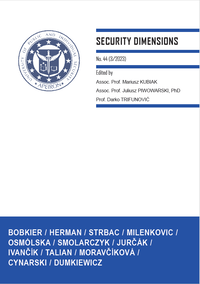Combating organised crime: exploring the intersection of cryptocurrencies and money laundering in Serbia
Combating organised crime: exploring the intersection of cryptocurrencies and money laundering in Serbia
Author(s): Katarina Štrbac, Dejan Lj. MilenkovićSubject(s): Security and defense
Published by: Wyższa Szkoła Bezpieczeństwa Publicznego i Indywidualnego “Apeiron” w Krakowie
Keywords: organised crime; cryptocurrencies; cyberspace; high-tech crime
Summary/Abstract: Background: This paper's central theme revolves around combating contemporary forms of organised crime by exploiting cryptocurrencies. It delves into the evolution of cryptocurrency structures, trends in the cryptocurrency market, and the intricate processes of transactions and money laundering involving digital currencies. The paper presents an overview of the most significant cryptocurrencies traded on electronic exchanges and explores their market characteristics. Objectives: This paper aims to conduct an in-depth analysis of the intersection between cryptocurrencies and high-tech crime, mainly focusing on money laundering, within the context of specific cases in the Republic of Serbia. Methods: The analysis commences by elucidating the nature of cryptocurrencies, with a particular emphasis on how the underlying technologies and applications contribute to heightened vulnerabilities. The subsequent segment of the analysis will then pivot towards delineating the extent of the money laundering predicament associated with cryptocurrencies. In the third section, the research will delve into the burgeoning Anti-Money Laundering (AML) regulations that govern cryptocurrencies, emphasising the ongoing development and implementation of such regulations in the Republic of Serbia. Results: The absence of borders in digital currencies and exchanges renders the current laws and regulations insufficient in dealing with illicit activities like cross-border money laundering. Consequently, it is imperative to establish consistent global rules to achieve uniformity in implementation promptly. Conclusion: Prioritising the pursuit of harmonisation becomes crucial as the FATF endeavours to formulate a universal benchmark. This international standard will facilitate the consistent enforcement of Anti-Money Laundering/Counter-Terrorist Financing (AML/CTF) laws and regulations on cryptocurrencies and blockchain technology.
Journal: Security Dimensions. International and National Studies
- Issue Year: 2023
- Issue No: 44
- Page Range: 54-67
- Page Count: 14
- Language: English

